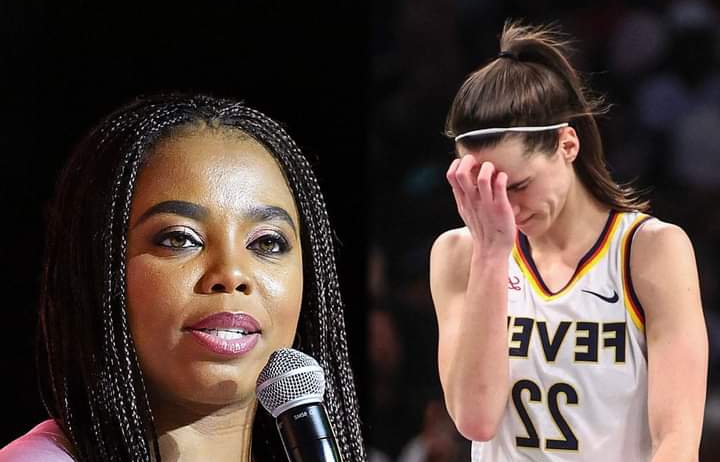Jemele Hill Unleashes Furious Rant Claiming Caitlin Clark Receives Different Treatment From Media Compared To Black Players
In a fiery and impassioned commentary, renowned journalist Jemele Hill has sparked intense debate by accusing the media of treating Iowa basketball star Caitlin Clark differently compared to Black players. Hill’s comments have drawn widespread attention and have once again highlighted the ongoing discussions about race and media bias in sports.

Hill, who has built a reputation for her candid and often provocative takes on social issues within sports, did not hold back in her recent remarks. “Caitlin Clark is an exceptional talent, no doubt about it,” Hill began, acknowledging the young guard’s impressive performances on the court. “But it’s become glaringly obvious that the media coverage she receives is markedly different from what Black players get, even when they exhibit the same or even greater levels of skill and achievement.”
Her argument centers on the perceived disparity in the media’s narrative construction around athletes based on their race. “Look at how quickly the media is to crown Clark as the next big thing, to shower her with praise, and to position her as the face of women’s college basketball,” Hill continued. “Now, compare that to the scrutiny and the different type of coverage that Black players often face. They have to overcome not just their opponents on the court, but also a narrative that doesn’t always give them their due respect.”
Hill pointed to specific examples, drawing contrasts between Clark and Black players who, in her view, have not received the same level of positive media attention. “Think about how often Black female athletes are critiqued for their attitudes, their behavior on the court, and how their successes are sometimes overshadowed by off-court controversies or stereotypes. Meanwhile, Clark is being celebrated unabashedly for her excellence—and rightly so—but why is there a discrepancy in how these athletes are portrayed?”
The reaction to Hill’s comments has been polarized. Supporters argue that she is shedding light on a very real issue of racial bias that permeates sports journalism. They believe that her willingness to tackle such a sensitive topic is necessary for fostering an honest conversation about inequality in media coverage.
On the other hand, critics accuse Hill of unnecessarily injecting race into a discussion about a talented athlete. They argue that Clark’s media coverage is a result of her exceptional performances and not indicative of a racial bias. Some have suggested that Hill’s comments detract from Clark’s accomplishments by framing them within a contentious narrative.
The debate Hill has ignited is not new. Conversations about racial bias in sports media have been ongoing for decades, with numerous studies and anecdotal evidence suggesting that athletes of different races are often treated differently by the press. These disparities can manifest in the tone of coverage, the focus of articles, and the overall narrative surrounding an athlete’s career.

Hill’s rant has certainly brought these issues to the forefront once again. “This isn’t about taking away from Caitlin Clark’s talent or achievements,” Hill clarified towards the end of her commentary. “It’s about recognizing that there’s a pattern in how we as a society—and specifically the media—choose to elevate some athletes while subjecting others to a different standard. Until we address these biases, we are not giving all athletes the fair and equal treatment they deserve.”
As the discussion continues, Hill’s comments serve as a reminder of the broader societal issues that impact sports and the importance of striving for equity and fairness in all forms of media coverage. Whether one agrees with her perspective or not, the conversation she has reignited is critical in the ongoing effort to achieve true equality in sports journalism.



